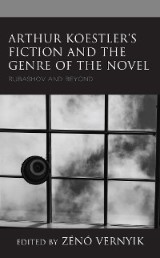Details

Arthur Koestler's Fiction and the Genre of the Novel
Rubashov and Beyond|
CHF 44.00 |
|
| Verlag: | Lexington Books |
| Format: | |
| Veröffentl.: | 17.09.2021 |
| ISBN/EAN: | 9781793622266 |
| Sprache: | englisch |
| Anzahl Seiten: | 306 |
DRM-geschütztes eBook, Sie benötigen z.B. Adobe Digital Editions und eine Adobe ID zum Lesen.
Beschreibungen
<p><span>Featuring a selection of brand new essays by a group of accomplished scholars, </span><span>Arthur Koestler's Fiction and the Genre of the Novel </span><span>covers all of Koestler's novels published in his lifetime, the first book to attempt this in English since Mark Levene's </span><span>Arthur Koestler</span><span>, published thirty-seven years ago. The team of contributors, with research backgrounds in history, political science, religious studies, law, linguistics and journalism besides literature, offers a truly multidisciplinary take on how Koestler's novels utilize, and at times transcend, the genre of the novel, and argues for their enduring relevance and appeal in the twenty-first century, inviting the reader to revisit and reassess them. With the topics of Koestler's novels including terrorism, massive migration, espionage, rape trauma, war trauma, the crisis of faith, propaganda, fake news and the role and responsibility of intellectuals in major international crises, as the volume aims to show, these texts are just as topical today, as they were at the time of their publication. </span></p>
<p><span>Arthur Koestler's Fiction and the Genre of the Novel</span><span>, the first volume published in English in almost four decades to cover all of the author's novels published in his lifetime, invites the reader to reassess Koestler's novels both in terms of their contribution to the genre of the novel, and their enduring topicality. </span></p>
<p><span>Foreword</span></p>
<p><span>Matthias Weßel</span></p>
<p><span>Acknowledgements</span></p>
<p><span>From Reviving the Dinosaur to Reconnecting with the Visionary: An Introduction to the Volume and an Overview of the State of Koestler Studies</span></p>
<p><span>Zénó Vernyik</span></p>
<p><span>Part 1: Between Genres and Subgenres</span></p>
<p><span>Chapter 1: </span><span>Bucco the Peasant</span><span>: A Play Embedded in </span><span>The Gladiators</span><span>, Its Narrative Function and Relevance for Understanding Koestler’s Fiction</span></p>
<p><span>Henry Innes MacAdam</span></p>
<p><span>Chapter 2: Can There Be Multiple Keys? </span><span>The Age of Longing</span><span> and the Genre of the Roman‑à‑clef</span></p>
<p><span>Zénó Vernyik</span></p>
<p><span>Part 2: The Political Novel</span></p>
<p><span>Chapter 3: Images of Revolution: Orwell’s </span><span>Animal Farm</span><span> and Koestler’s </span><span>The Gladiators</span></p>
<p><span>Stephen Ingle</span></p>
<p><span>Chapter 4: Bernard’s Vision of the Totalitarian State in </span><span>Arrival and Departure</span><span>: A Discourse Analytical View of Political Metaphors</span></p>
<p><span>Uwe Klawitter</span></p>
<p><span>Part 3: Investigating the Self and Its Dilemmas through the Prism of the Novel</span></p>
<p><span>Chapter 5: Beyond Communism: Reflections on Rubashov’s Character from the Perspectives of Identity, Ethics and Relevance</span></p>
<p><span>Alice Eged</span></p>
<p><span>Chapter 6: Rubashov’s Heritage: The Tragedy of Futility – Portraying the Individual Where No Individuality Is Allowed</span></p>
<p><span>Krisztián Kacsinecz and Szilvia Deisler</span></p>
<p><span>Part 4: The Zionist Novel: Nation, Identity and Race</span></p>
<p><span>Chapter 7: </span><span>Thieves in the Night</span><span>: Land and Identity</span></p>
<p><span>Jenni Calder</span></p>
<p><span>Chapter 8: Arthur Koestler and the Jewish Race According to </span><span>Thieves in the Night</span></p>
<p><span>Motti Inbari</span></p>
<p><span>Part 5: The Novel as Summary</span></p>
<p><span>Chapter 9: </span><span>The Call-Girls</span><span>: A Valedictory Novel</span></p>
<p><span>Louis Gordon</span></p>
<p></p>
<p><span>Matthias Weßel</span></p>
<p><span>Acknowledgements</span></p>
<p><span>From Reviving the Dinosaur to Reconnecting with the Visionary: An Introduction to the Volume and an Overview of the State of Koestler Studies</span></p>
<p><span>Zénó Vernyik</span></p>
<p><span>Part 1: Between Genres and Subgenres</span></p>
<p><span>Chapter 1: </span><span>Bucco the Peasant</span><span>: A Play Embedded in </span><span>The Gladiators</span><span>, Its Narrative Function and Relevance for Understanding Koestler’s Fiction</span></p>
<p><span>Henry Innes MacAdam</span></p>
<p><span>Chapter 2: Can There Be Multiple Keys? </span><span>The Age of Longing</span><span> and the Genre of the Roman‑à‑clef</span></p>
<p><span>Zénó Vernyik</span></p>
<p><span>Part 2: The Political Novel</span></p>
<p><span>Chapter 3: Images of Revolution: Orwell’s </span><span>Animal Farm</span><span> and Koestler’s </span><span>The Gladiators</span></p>
<p><span>Stephen Ingle</span></p>
<p><span>Chapter 4: Bernard’s Vision of the Totalitarian State in </span><span>Arrival and Departure</span><span>: A Discourse Analytical View of Political Metaphors</span></p>
<p><span>Uwe Klawitter</span></p>
<p><span>Part 3: Investigating the Self and Its Dilemmas through the Prism of the Novel</span></p>
<p><span>Chapter 5: Beyond Communism: Reflections on Rubashov’s Character from the Perspectives of Identity, Ethics and Relevance</span></p>
<p><span>Alice Eged</span></p>
<p><span>Chapter 6: Rubashov’s Heritage: The Tragedy of Futility – Portraying the Individual Where No Individuality Is Allowed</span></p>
<p><span>Krisztián Kacsinecz and Szilvia Deisler</span></p>
<p><span>Part 4: The Zionist Novel: Nation, Identity and Race</span></p>
<p><span>Chapter 7: </span><span>Thieves in the Night</span><span>: Land and Identity</span></p>
<p><span>Jenni Calder</span></p>
<p><span>Chapter 8: Arthur Koestler and the Jewish Race According to </span><span>Thieves in the Night</span></p>
<p><span>Motti Inbari</span></p>
<p><span>Part 5: The Novel as Summary</span></p>
<p><span>Chapter 9: </span><span>The Call-Girls</span><span>: A Valedictory Novel</span></p>
<p><span>Louis Gordon</span></p>
<p></p>
<p><span>Zénó Vernyik </span><span>is assistant professor and head of the English department at the Technical University of Liberec.</span></p>

















